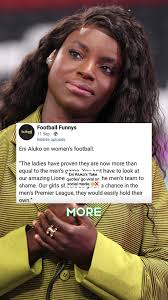The Impact of Eni Aluko in Football and Beyond

Introduction
Eni Aluko, a name synonymous with talent and tenacity in the world of football, has made significant strides not only on the pitch but also as an advocate for various social causes. As a former player for the England women’s national football team and a prominent figure in discussions around equality and representation in sports, Aluko’s journey is a testament to the impact one individual can have on both sports and society.
A Glorious Football Career
Born on 21st February 1987 in Solihull, England, Eni Aluko began her football career at Birmingham City before moving to clubs such as Charlton Athletic and Chelsea, where she enjoyed significant success. Notably, she earned over 100 caps for the England national team and participated in crucial tournaments including the UEFA Women’s Euro and FIFA Women’s World Cup. Aluko’s playing style, marked by her technical skills, speed, and strategic thinking, won her admiration from fans and respect from opponents alike.
Challenges and Advocacy
Beyond her athletic prowess, Aluko has been a strong voice against discrimination and inequality in sports. In 2017, she publicly shared her experiences of racial discrimination while working within the football community, sparking widespread discussions about race and diversity in British football. Her courage in addressing these issues made her a prominent figure not just in women’s sports but in the broader conversation on equality.
Current Endeavours and Future Prospects
After retiring from professional football in 2020, Aluko has continued to advocate for change. She is actively involved with various charities that focus on young people’s empowerment and education, further proving her commitment to making a difference off the pitch. Additionally, Aluko has transitioned into media, frequently appearing as a pundit on sports channels, thereby maintaining her influence in the sports community.
Conclusion
Eni Aluko’s contributions to football and society extend far beyond her impressive athletic accomplishments. Her advocacy work, commitment to equality, and ongoing influence in the media showcase her as a multifaceted individual dedicated to bringing about positive change. As discussions around inclusivity continue to evolve, Aluko remains a pivotal figure, inspiring both current athletes and future generations. For readers interested in the intersection of sports and social justice, Aluko’s career and activism serve as a compelling reminder of the power of sport as a platform for change.









